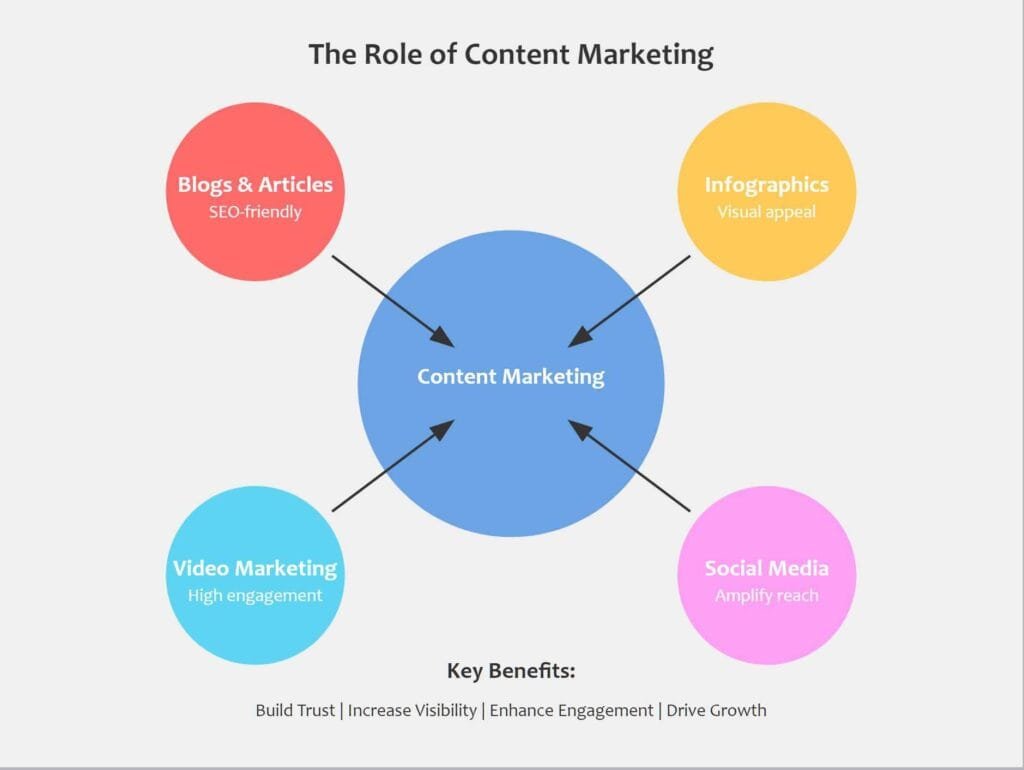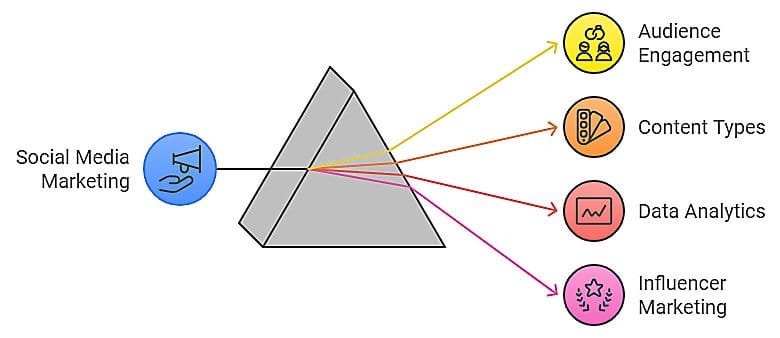Key Takeaways: Digital Marketing Essentials
- Digital marketing is essential for engaging audiences and driving growth.
- Various methods include SEO, content marketing, social media marketing, and more.
- Each method plays a vital role in enhancing online visibility.
- Understanding these strategies is crucial for website owners starting out in digital marketing.
🚀 Demystifying Digital Marketing: A Beginner’s Guide 🚀
In today’s business environment, digital marketing has become a key strategy for fostering engagement and driving growth. It refers to various online methods through which businesses communicate with their audience and promote their products or services.
Digital marketing encompasses tactics like search engine optimisation (SEO), social media marketing, content marketing, email marketing, pay-per-click (PPC) advertising, affiliate marketing, influencer marketing, and video marketing. Each of these contributes to enhancing a business’s online presence.
The significance of digital marketing cannot be overstated. As more consumers shift their attention online, businesses that effectively harness digital marketing can reach a broader audience and generate leads. Ultimately, this leads to increased sales. However, many website owners face challenges in navigating this complex landscape.
The vast array of tools and strategies can be overwhelming. Without proper guidance, achieving a successful digital marketing strategy can feel daunting. A foundational understanding of these strategies is essential for any business looking to establish or enhance its online presence.
Each component—from SEO to social media marketing—plays a critical role in creating an integrated approach that maximises visibility and engagement. For instance, effective content marketing provides valuable information that attracts potential customers. A strong social media presence facilitates connection and interaction with the audience.
Moreover, leveraging video marketing enhances communication effectiveness and captures attention in an increasingly visual digital landscape. In the following sections, we will delve deeper into these strategies. This guide aims to break down the complexities of digital marketing, making it more accessible for beginners seeking to establish a strong foothold in the online market.
Understanding Search Engine Optimisation (SEO)
Search Engine Optimisation (SEO) is fundamental to digital marketing. It focuses on improving the visibility and ranking of websites on search engine results pages (SERPs). By optimising a website’s content and structure, businesses can enhance their online presence and attract organic traffic.

SEO is crucial because it helps potential customers find a website when searching for relevant keywords. This increases the likelihood of engagement and conversion. One essential practice in SEO is keyword research. This involves identifying the terms potential customers use when searching for products or services.
Understanding these keywords enables marketers to create content that aligns with user intent. This effectively increases the chances of ranking higher in search engine results. Tools like Google Keyword Planner and SEMrush can help discover valuable keywords that resonate with your target audience.
On-page optimisation is another critical component of SEO. This practice focuses on enhancing individual web pages to improve their search engine rankings. Key elements include optimising title tags, meta descriptions, header tags, and using relevant keywords throughout the content.
Additionally, ensuring that the website is user-friendly contributes significantly to improved SEO performance. A robust content strategy is also essential for effective SEO. High-quality, relevant content engages users and encourages other websites to link back.
Including various content types—such as articles, infographics, and videos—can enhance user engagement and increase dwell time. This further boosts your site’s ranking potential. In conclusion, mastering SEO is vital for any digital marketing strategy.
By effectively executing keyword research, on-page optimisation, and content marketing, businesses can significantly improve their website’s visibility. Ultimately, this drives organic traffic and supports overall marketing goals.
The Role of Content Marketing

Content marketing is an essential pillar of any effective digital marketing strategy. It focuses on creating and distributing valuable content aimed at attracting a clearly defined target audience. By consistently delivering informative material, businesses can enhance their online presence while building trust within their industry.
Various forms of content can maximise impact. For instance, blogs and articles are commonly employed formats that allow brands to share insights and educational material. By integrating key themes and industry-relevant topics, companies can utilise SEO techniques to increase visibility in search engine results.
Infographics are another compelling tool that enables brands to present complex information in an easily digestible format. Their visual appeal engages users effectively while encouraging social sharing and increasing backlinks—further boosting SEO performance.
Video marketing is also gaining popularity as it captivates audiences with dynamic content. Producing high-quality videos can significantly enhance audience engagement and improve brand perception.
Moreover, successful content marketing fosters relationships with consumers by converting them from passive viewers to active participants. By employing social media strategies to promote content, businesses can encourage interaction while amplifying their reach.
In conclusion, content marketing is not just about promoting products or services; it involves creating a consistent flow of information that meets audience needs. By investing in diverse content types alongside effective digital strategies, brands can position themselves as authorities in their niche while driving growth.
Leveraging Social Media Marketing
Social media marketing has emerged as a pivotal component of digital strategies. It enables brands to connect with their audience in real time across platforms like Facebook, Instagram, Twitter, LinkedIn, and TikTok. Each platform offers unique advantages catering to different demographics and content types.

For instance, Facebook has an extensive user base with detailed targeting options suitable for brand awareness and customer engagement. Instagram excels in visual content ideal for brands focusing on aesthetics while LinkedIn serves as a professional networking hub beneficial for B2B services.
Creating engaging posts tailored to specific audiences is crucial for effective social media marketing. Marketers should produce high-quality content that resonates with their target demographic—ensuring it is informative or entertaining.
Utilising a mix of content types—such as images, videos, polls, and stories—can enhance engagement while stimulating conversation. Additionally, adopting a community-driven approach is essential; social media thrives on interaction and relationship-building.
Brands should actively engage with their audience through comments and user-generated content to foster loyalty within their community. Moreover, leveraging data analytics provided by these platforms helps marketers track performance while refining strategies.
Understanding what drives engagement allows brands to iterate quickly while maximising their online presence. As social media continues evolving, integrating innovative tactics like influencer marketing will further solidify its role in comprehensive digital strategies.
Effective Email Marketing Techniques
Email marketing remains a cornerstone of successful digital strategies—particularly for nurturing existing customer relationships. It allows businesses to communicate directly with their audience by delivering tailored messages that enhance engagement.

One essential strategy involves crafting tailored messages that resonate with your audience through segmentation based on behaviour or demographics. This approach allows businesses to send personalised content directly addressing different groups’ interests.
For instance, companies might use data analytics to create targeted campaigns enhancing relevance and impact messaging. Automated email sequences are another powerful technique that significantly improves efficiency.
By setting up automated workflows for timely communication—such as welcome emails or promotional offers—businesses maintain engagement with subscribers while encouraging exploration of new offerings.
Employing A/B testing on different email formats helps determine what resonates best with your audience—allowing continuous improvement of your email strategy. Incorporating clear calls-to-action (CTAs) within emails is vital for driving conversions.
Whether prompting readers to visit a website or utilise special offers—effective CTAs guide subscribers towards desired actions. By implementing these techniques businesses can enhance their online presence while bolstering brand loyalty—increasing conversion rates along the way.
Getting Started with Pay-Per-Click (PPC) Advertising
Pay-Per-Click (PPC) advertising is an essential component of digital marketing that enables immediate visibility while driving relevant traffic to your online presence. PPC allows advertisers to bid on keywords displaying ads on search engines or social media platforms—providing an efficient way to connect with potential customers.
The primary advantage of PPC is that advertisers only pay when someone clicks on their ad—making it cost-effective for acquiring leads. To set up a successful PPC campaign one must first identify appropriate keywords through thorough research.
Tools like Google Keyword Planner assist in discovering terms your target audience searches for—helping you create compelling ad copy capturing prospects’ attention through strong CTAs or clear value propositions.
Next, it’s important to establish a bidding strategy using automated bidding offered by platforms like Google Ads which optimise bids based on predefined goals—this eases management while maximising results.
Alternatively manual bids provide more control over costs; however be prepared to adjust keywords based on campaign performance regularly reviewing key metrics such as Click-Through Rate (CTR), Cost Per Click (CPC), and Conversion Rate offers insights into how well your ads perform.
Ultimately by effectively implementing PPC advertising within your digital strategy you can achieve better visibility while increasing conversion rates for your business.
Exploring Affiliate Marketing
Affiliate marketing is a performance-based strategy enabling brands to partner with affiliates who promote products or services in exchange for commissions on sales generated through referrals. This mutually beneficial arrangement allows companies to broaden their online presence by leveraging diverse affiliates’ reach—from bloggers to established websites.
Consequently businesses can increase market reach without incurring significant upfront costs—making it attractive for both startups and established brands alike. To set up an affiliate program effectively begin by defining goals along with key performance indicators (KPIs) measuring success.
Next selecting the right affiliates is critical; choosing influencers whose audiences align with your brand enhances program effectiveness significantly ensuring partners have experience in content or social media marketing as they create engaging promotional materials resonating with potential customers.
Attracting suitable affiliates involves offering enticing commission structures alongside support resources such as SEO materials enabling them to create attractive promotional content improving visibility while driving traffic further amplified by incorporating various channels like video marketing or PPC advertising drawing more traffic potential conversions into play.
Ultimately affiliate marketing serves as a valuable tool allowing brands expansion while effectively managing costs associated with traditional advertising methods through thoughtful strategies fostering strong partnerships unlocking full potential of this performance-based approach successfully!
Harnessing Influencer Marketing
In today’s dynamic landscape influencer marketing has emerged as a powerful strategy enabling brands expansion while engaging new audiences effectively promoting products or services leveraging trust influencers hold within specific niches among followers alike!
Identifying suitable influencers proves crucial; brands should conduct thorough research pinpointing those whose values align closely with brand identity targeting audiences effectively! Various tools assist evaluating reach engagement rates demographic insights helping select individuals possessing strong followings exhibiting authentic engagement likely promoting brands effectively!
Building partnerships involves various approaches such as offering free products financial incentives creating exclusive content! Open communication ensures both parties align goals expectations regarding collaboration sharing campaign objectives co-creating resonating impactful efforts!
Leveraging established trust maximises credibility visibility! When influencers authentically endorse brands audiences perceive genuine recommendations rather than standard advertisements! Natural integration leads increased engagement conversions proving invaluable part comprehensive digital strategy!
Integrating Video Marketing Into Your Strategy
Video marketing has emerged as pivotal component transforming how brands connect audiences! With exponential rise consumption businesses increasingly recognise importance integrating medium overall strategy! Various types created range from informative tutorials engaging demonstrations captivating storytelling behind-the-scenes glimpses each playing unique role enhancing presence fostering deeper connections!
Platforms distribution diverse encompassing channels like Facebook Instagram TikTok video-sharing sites YouTube Vimeo! Understanding where target audience consumes video crucial maximising reach effectiveness! Short-form videos thrive platforms TikTok Instagram Reels whereas long-form suited YouTube users often seek information!
To integrate video effectively align goals determining KPIs such as engagement rates click-through rates conversion metrics! Incorporating SEO practices optimising titles descriptions tags relevant keywords enhances discoverability search engines sharing videos email campaigns bolsters engagement drives traffic site!
By thoughtfully combining content video brands convey messages effectively increasing audience ultimately driving conversions reinforcing critical role modern digital strategy!
FAQ
What is digital marketing?
Digital marketing refers to various online methods used by businesses to communicate with audiences and promote products or services.
Why is SEO important?
SEO improves website visibility on search engines which helps attract organic traffic from potential customers searching relevant keywords.
What are some effective email marketing techniques?
Crafting tailored messages through segmentation automates email sequences incorporating clear calls-to-action are vital for driving conversions.
How does PPC advertising work?
PPC allows advertisers to bid on keywords displaying ads online; they only pay when someone clicks on their ad making it cost-effective.
What role does influencer marketing play?
Influencer marketing enables brands to leverage trusted individuals’ credibility within specific niches promoting products or services effectively among followers.
Here are some resources to check out:
- HubSpot: A leading resource for marketing, sales, and customer service information. They offer a wealth of articles, guides, and tools related to digital marketing.
- Neil Patel: A well-known figure in the digital marketing space, Neil Patel’s website provides extensive resources on SEO, content marketing, and more.
- Moz: Renowned for its SEO tools and resources, Moz offers insightful articles and guides on search engine optimisation and digital marketing strategies.
- Search Engine Journal: This site provides news, trends, and best practices in SEO, PPC, social media, and content marketing.
- Content Marketing Institute: A leading resource for content marketing education and training with a variety of articles and research reports.
- Social Media Examiner: This site focuses on social media marketing strategies and tips, providing valuable insights for businesses looking to enhance their social media presence.
- Buffer Blog: Buffer offers insights on social media management and marketing strategies, along with tips for effective engagement.





